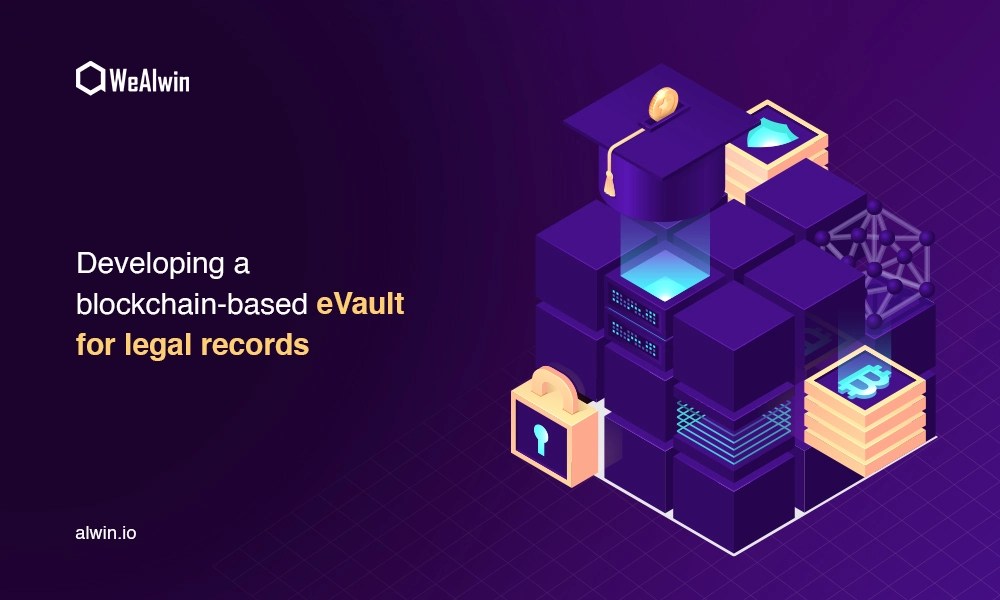Welcome to the future of legal record-keeping, where the traditional filing cabinets and piles of paper are being replaced by something far more secure, efficient, and innovative - say hello to the blockchain eVault. This remarkable technology is not just transforming the way we store legal documents; it's revolutionizing the very fabric of data security and accessibility. Imagine a world where your important legal records are not only safe but also easily accessible with just a few clicks. That's the promise of blockchain eVault, and in this blog, we'll show you how it's changing the game. Let's explore blockchain technology, legal records, and eVaults together!
How is blockchain used in the legal industry?
Blockchain technology is not just about cryptocurrencies. In the legal industry, it's making waves by offering solutions that were previously unthinkable. Blockchain eVaults are used to securely store sensitive legal documents, such as contracts, wills, and property deeds. Beyond storage, blockchain facilitates the verification of document authenticity and the tracking of changes over time without disputes. Also, smart contracts automate and streamline processes, reducing the need for manual intervention and making transactions both faster and less prone to human error.
This transformative technology offers unprecedented security and efficiency, making it a game-changer in the legal sector. As adoption spreads, the future of legal record-keeping looks more secure and transparent, thanks to blockchain eVaults.
What is the blockchain-based vault for legal records?
Blockchain-based vaults, also known as eVaults, are digital repositories that utilize blockchain technology to secure legal records. This innovative solution transforms how documents are stored, accessed, and authenticated across the legal industry. Unlike traditional databases, a blockchain eVault operates on a decentralized network, ensuring that every transaction or modification is recorded in a way that is immutable and transparent. This means that once a document is entered into the eVault, its integrity is preserved, making alterations or unauthorized access practically impossible.
Benefits of using blockchain for data security
Using blockchain technology to create secure eVaults for legal records offers multiple advantages. Furthermore, it enhances data security significantly by employing encryption and decentralization, minimizing the risks associated with data breaches. Also, blockchain ensures data integrity, as each entry is time-stamped and linked to the preceding transaction, creating an unalterable record of transactions.
Additionally, blockchain eVaults improve accessibility and efficiency in document retrieval without compromising security. Plus, they can drastically reduce operational costs by eliminating the need for extensive physical storage and manual record-keeping.
Legal Record-Keeping Challenges
Current issues with traditional legal record-keeping methods
Traditional legal record-keeping methods face several challenges, including vulnerability to data breaches, inefficient document retrieval processes, and the high cost of physical storage. Paper-based files not only require significant space but also pose a risk of damage or loss. Additionally, these conventional methods often involve time-consuming processes for document verification and duplication, hampering productivity and increasing operational costs.
Importance of data security in legal documentation
In the realm of legal documentation, data security is paramount. The sensitive nature of legal records, from personal client information to case details, demands the highest level of security to prevent unauthorized access and ensure client confidentiality. As cyber threats become more sophisticated, the importance of adopting secure and reliable methods for legal record-keeping cannot be overstated. Blockchain technology, with its inherent security features, presents a promising solution to safeguard legal records against potential cyberattacks and ensure the privacy of all parties involved.
eVaults
The digital landscape continues to evolve rapidly, keeping legal records secure yet accessible is paramount. That's where electronic vaults, or eVaults, come into play. As a cutting-edge solution, eVaults is reshaping how sensitive documents are stored, shared, and managed.
What is an eVault?
An eVault is a secure digital repository designed to store electronic documents and digital assets. It ensures the integrity, authenticity, and accessibility of the documents it holds, using advanced encryption and digital signatures. This technology acts as a virtual safe, offering a higher level of security for legal records and other confidential information.
How are eVaults transforming record-keeping practices?
The digital nature of eVaults allows for instantaneous access to documents, eliminating the need for physical storage spaces and reducing the risk of loss or damage. They streamline document management processes, enable easy sharing and collaboration among authorized users, and maintain a detailed audit trail of all activities. This transformation leads to more efficient and secure record-keeping practices, adapting to the demands of the modern world.
Benefits of Using Blockchain eVaults:
Blockchain technology introduces an additional layer of security and functionality to electronic vaults, making blockchain eVaults a game-changer in legal record-keeping.
Enhanced security features
Blockchain eVaults leverage the inherent security properties of blockchain technology, such as decentralization and cryptographic hashing. This makes tampering with documents nearly impossible, ensuring the integrity of the records at all times. Each document stored in a blockchain eVault is encrypted and has its unique digital fingerprint, enhancing privacy and security.
Transparency in the auditing process
The transparency feature of blockchain allows for a transparent and immutable audit trail. Every transaction or modification is recorded on the blockchain, providing a real-time and incorruptible log. This makes auditing processes more straightforward and trustworthy, as auditors can easily verify the authenticity of documents without questioning their integrity.
Cost-efficiency compared to traditional methods
Blockchain eVaults can significantly reduce the costs associated with paper-based systems and traditional electronic document management systems. They eliminate the need for physical document storage, reduce administrative overheads, and simplify compliance processes. The efficiencies gained translate into direct cost savings for organizations, making blockchain eVaults not only more secure but also more economically viable.
Implementing a Secure Blockchain eVault
Blockchain technology is changing the game for storing and managing legal documents. By implementing a secure blockchain eVault, legal entities can ensure the safety and integrity of their records. But, how do you set this up? Let's break it down into simple steps and best practices.
Consult with our business experts regarding blockchain business! Chat with us on WhatsApp
Steps to set up a blockchain eVault
Setting up a blockchain eVault involves a few critical steps. First, choose a blockchain platform that aligns with your security needs and compliance requirements. Next, design your eVault's architecture, considering how records will be stored, accessed, and managed. Then, develop smart contracts to automate processes like verification and permissions. After setup, rigorously test the eVault with simulated scenarios to check its resilience and security features. Finally, roll out the system to users with comprehensive training on how to use and manage it effectively.
Best practices for maintaining data integrity and security
To keep your blockchain eVault secure and its data intact, employing best practices is essential. Use strong encryption techniques for data at rest and in transit. Regularly update the blockchain platform and smart contracts to patch vulnerabilities. Implement robust authentication and access control measures. Also, routinely audit the system and conduct security assessments to detect and mitigate potential risks. By adhering to these practices, your eVault will remain a bastion of security in the digital legal landscape.
What are the two types of records that are in the blockchain database?
In the fascinating world of blockchain technology, two main types of records form the backbone of the database: transaction records and block records. Let's break them down:
Transaction Records: Essentially, these are the individual actions or agreements made between parties. Imagine you're sending a document or a digital asset to someone else. That action, including all its details (who sent it, who received it, when it was sent, etc.), is securely stored as a transaction record. It’s like having a notary public in your pocket, verifying every move you make.
Block Records: Now, think of a block as a page in a ledger. Each block groups together a bunch of these transaction records, creating a batch. Once a block is filled with transactions, it's sealed off, and a new block begins. This chaining of blocks (hence, blockchain) ensures that every transaction is permanently recorded in sequence. It's like a history book that can't be erased or altered.
Transforming Legal Documents into Smart Contracts:
Legal documents, the traditional process of handling paperwork can be cumbersome and prone to errors or disputes.
However, with the advent of blockchain technology, there lies a transformative opportunity to convert these legal documents into smart contracts.
Smart contracts are self-executing contracts with the terms of the agreement directly written into code.
By encoding legal agreements onto a blockchain network, the process becomes more secure, transparent, and efficient.
This transformation not only ensures the integrity of the documents but also automates the execution of contractual obligations, reducing the need for intermediaries and enhancing trust between parties.
Technical Components for Different Users:
Developing a blockchain-based eVault for legal records requires a robust infrastructure that caters to the needs of different users.
For legal professionals, the technical components may include a user-friendly interface for uploading and managing documents, secure encryption protocols to protect sensitive information, and access controls to regulate document permissions.
On the other hand, end-users may interact with the eVault through a seamless dashboard, enabling them to retrieve and verify legal records with ease.
Additionally, incorporating features such as digital signatures, timestamping, and audit trails can enhance the overall security and authenticity of the stored documents, providing a comprehensive solution for diverse user requirements.
Creating Smart Legal Contracts on the Blockchain:
The process of creating smart legal contracts on the blockchain involves a series of steps to ensure the integrity and functionality of the eVault. To begin with, the platform must be built on a blockchain network that supports smart contracts, enabling the execution of self-enforcing agreements.
A smart contract code is then developed to define the rules and conditions for storing and accessing legal records within the eVault.
This code specifies the logic behind document management, user permissions, and dispute resolution mechanisms, ensuring a transparent and automated process.
By deploying these smart contracts on the blockchain, legal professionals and users can interact with the eVault securely, leveraging the benefits of decentralized technology to safeguard their legal records effectively.
The development of a blockchain-based eVault for legal records presents a transformative solution for secure document storage and management. By leveraging smart contracts and blockchain technology, the process of handling legal documents can be streamlined, ensuring trust, transparency, and efficiency for all parties involved. As the legal industry continues to embrace digital innovation, the adoption of blockchain-based eVaults holds immense potential for revolutionizing the way legal records are stored and accessed in the digital age.
Future Trends in Legal Record-Keeping
Predictions for the future of legal record-keeping with blockchain technology
Looking into the crystal ball of legal record-keeping reveals a future where blockchain technology plays a starring role. We're talking about a world where every contract, every agreement, and every legal document is stored in a secure, unalterable state within the blockchain. Imagine the ease of accessing any legal record in seconds, without doubting its authenticity or completeness. Blockchain could streamline legal processes, making them more transparent, efficient, and trustworthy.
Potential challenges and opportunities
With every innovation comes a set of challenges and opportunities. The legal realm is no exception when integrating blockchain technology. Here are a few to consider:
Challenges: Adoption and adaptation. For many in the legal field, moving from traditional paper-based systems to a blockchain eVault requires a significant shift in mindset and operations. There's also the hurdle of ensuring privacy and compliance with regulatory standards.
Opportunities: On the flip side, the potential rewards are massive. A blockchain eVault promises unparalleled security against fraud and tampering. Moreover, it offers a way to drastically reduce the time and cost associated with document verification and transactions. This could lead to more agile legal processes, where the focus shifts from administrative paperwork to strategic decision-making and dispute resolution.
As we venture further into this era of digital transformation, the future of legal record-keeping seems poised for a revolution, with blockchain technology leading the charge.
Reach out to us to develop a blockchain-based eVault for legal records
As the digital era evolves, securing legal documents has never been more critical. Transitioning from traditional paper-based storage to a blockchain-enabled eVault ensures reliability, transparency, and unparalleled security for your legal records. Understanding the complexities of blockchain technology and integrating it into an efficient and secure electronic vault (eVault) for legal records might sound daunting. That's where our expertise comes into play.
Our team of blockchain experts is here to guide you through every step of the process. From concept to deployment, we ensure your transition to a blockchain-based eVault is smooth and hassle-free.
We understand that every organization has unique needs. That’s why we offer custom solutions tailored to your specific legal record-keeping requirements, ensuring that your eVault is a perfect fit for your organization.
Our commitment to you extends beyond the initial setup. We offer ongoing support and updates to ensure your blockchain eVault stays secure against emerging threats and remains compliant with evolving legal standards.
Become a part of the revolution in legal record-keeping. Secure your legal documents with the power of blockchain technology and embark on a journey to digital resilience. Reach out today to explore how we can tailor a blockchain-based eVault solution just for you.
As technology continues to evolve, the integration of blockchain into legal record-keeping through secure eVaults is not just a trend, but a necessity. It promises enhanced security, remarkable efficiency, and unparalleled access control, completely transforming how we manage and protect legal documents. The future of legal record-keeping is bright, with blockchain technology at its helm, setting a new standard for data security and integrity in the digital age.



